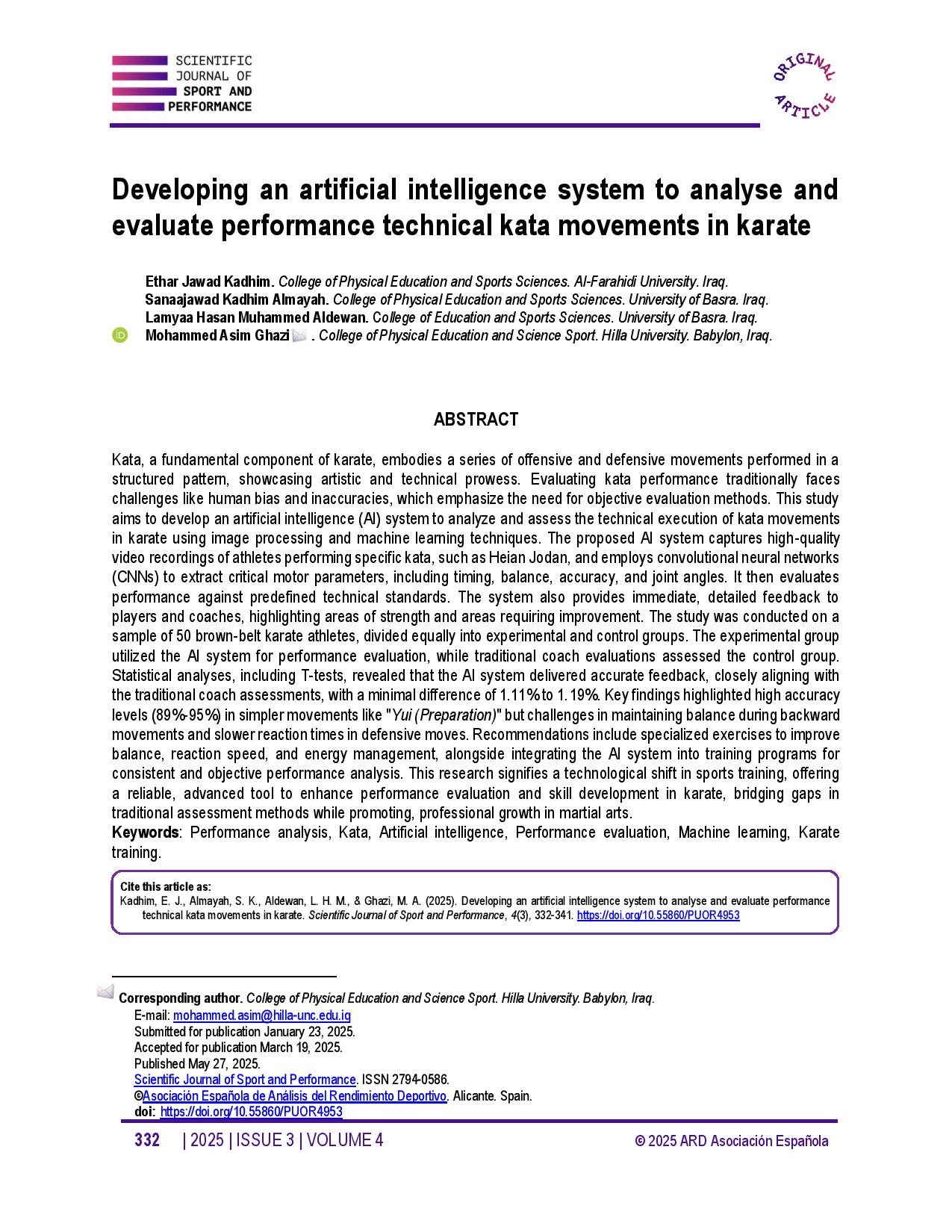Developing an artificial intelligence system to analyse and evaluate performance technical kata movements in karate
Main Article Content
Abstract
Kata, a fundamental component of karate, embodies a series of offensive and defensive movements performed in a structured pattern, showcasing artistic and technical prowess. Evaluating kata performance traditionally faces challenges like human bias and inaccuracies, which emphasize the need for objective evaluation methods. This study aims to develop an artificial intelligence (AI) system to analyze and assess the technical execution of kata movements in karate using image processing and machine learning techniques. The proposed AI system captures high-quality video recordings of athletes performing specific kata, such as Heian Jodan, and employs convolutional neural networks (CNNs) to extract critical motor parameters, including timing, balance, accuracy, and joint angles. It then evaluates performance against predefined technical standards. The system also provides immediate, detailed feedback to players and coaches, highlighting areas of strength and areas requiring improvement. The study was conducted on a sample of 50 brown-belt karate athletes, divided equally into experimental and control groups. The experimental group utilized the AI system for performance evaluation, while traditional coach evaluations assessed the control group. Statistical analyses, including T-tests, revealed that the AI system delivered accurate feedback, closely aligning with the traditional coach assessments, with a minimal difference of 1.11% to 1.19%. Key findings highlighted high accuracy levels (89%-95%) in simpler movements like "Yui (Preparation)" but challenges in maintaining balance during backward movements and slower reaction times in defensive moves. Recommendations include specialized exercises to improve balance, reaction speed, and energy management, alongside integrating the AI system into training programs for consistent and objective performance analysis. This research signifies a technological shift in sports training, offering a reliable, advanced tool to enhance performance evaluation and skill development in karate, bridging gaps in traditional assessment methods while promoting, professional growth in martial arts.
Article Details

This work is licensed under a Creative Commons Attribution-NonCommercial-ShareAlike 4.0 International License.
References
Asadi, H. &. (2020). Deep learning in sports: Application of convolutional neural networks for performance analysis. Journal of Sports Science & Medicine.
Attilio, S. A. (2015). Infrared thermography-calorimetric quantitation of energy expenditure in biomechanically different type.
Ayane, K. K. (2021). Control of Accuracy during Movements of High Speed: Implications from Baseball Pitching. Journal of Motor Behavior. https://doi.org/10.1080/00222895.2021.1960789 DOI: https://doi.org/10.1080/00222895.2021.1960789
Erdem, S. (2023). An eighty percent pass accuracy may be a critical level on soccer team success. Sport TK. https://doi.org/10.6018/sportk.482891 DOI: https://doi.org/10.6018/sportk.482891
Fábio, A. D. (2012). Energy demands in taekwondo athletes during combat simulation.. European Journal of Applied Physiology.
Ghazi, M. (2021). The role of artificial intelligence in teaching and evaluating some of the basic skills in karate. Journal of Sport Science Technology and Physical Activities, 2(2).
Ghazi, M. A. (2023). Performance Measures in Evaluating the Effectiveness of Teaching Methods and Skills in Karate. Physical Activity Journal (PAJU), 5(1), 61-70. https://doi.org/10.20884/1.paju.2023.5.1.9384 DOI: https://doi.org/10.20884/1.paju.2023.5.1.9384
Ghazi, M. A. (2024). Facial fingerprint analysis using artificial intelligence techniques and its ability to respond quickly during karate (kumite). Journal of Human Sport and Exercise, 19(2), 679-689. https://doi.org/10.55860/r05vhj78 DOI: https://doi.org/10.55860/r05vhj78
Ghazi, M. A. (2025). Enhancing karate skill performance through virtual visuals and artificial intelligence techniques. Scientific Journal of Sport and Performance, 4(1), 31-39. https://doi.org/10.55860/DMGX3014 DOI: https://doi.org/10.55860/DMGX3014
Ghazi, M. (2021). The role of artificial intelligence in teaching and evaluating some of the basic skills in karate. Journal of Sport Science Technology and Physical Activities, 2(2).
Ghazi, M. A. (2022). The Effect of the Artificial Intelligence Techniques Towards Psychomotor Performance Modelling to Improve Sports Performance in Karate. Automation, Control and Intelligent Systems, 10(3), 35-40.
Katsue, K. M. (2016). Development of throwing accuracy in elementary school handball players.
Kim, J. &. (2022). Application of artificial intelligence in movement analysis: A review. Journal of Biomechanics.
Kzar, M. H. (2024). Mechanical angle foot during jumping and correct landing method. Modern Sport, 23(4), 1-7. https://doi.org/10.54702/hj1agh21 DOI: https://doi.org/10.54702/hj1agh21
Nurcahyo, P. J., Kusnandar, K., Budi, D. R., Listiandi, A. D., Estrella, E. O., Khan, M. A., ... & Shahril, M. I. (2025). Examining the determinant factor of football technical skills. Retos: nuevas tendencias en educación física, deporte y recreación, (63), 846-854. https://doi.org/10.47197/retos.v63.108206 DOI: https://doi.org/10.47197/retos.v63.108206
Seong-Geun, O. J.-H. (2014). A Comparative Study on the Kinetic Factors in Taekkyon Nakcyguri with and without Hip Bending. Korean Journal of Sport Biomechanics. https://doi.org/10.5103/KJSB.2014.24.3.277 DOI: https://doi.org/10.5103/KJSB.2014.24.3.277
Wang, T. &. (2021). AI-based performance evaluation system in martial arts. International Journal of Sports Technology.




